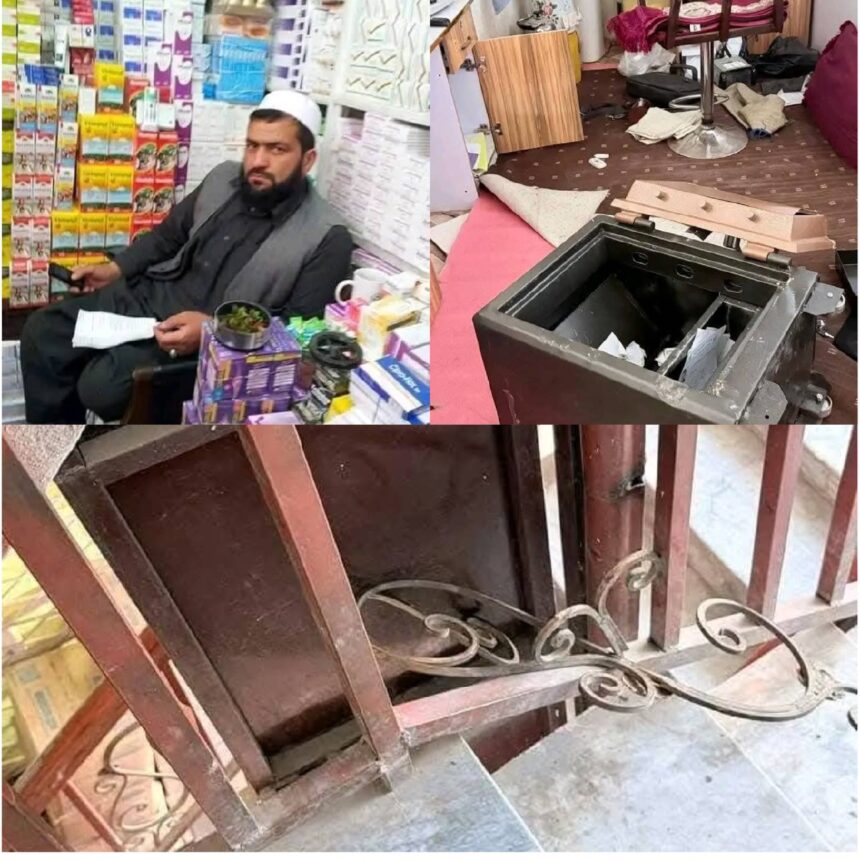RASC News Agency: In the midst of Afghanistan’s spiraling insecurity under Taliban rule, residents of Deh Salah district in Andarab, Baghlan province, have reported a shocking incident of armed robbery targeting a local currency exchange shop perpetrated mere meters from the Taliban’s own police and intelligence headquarters. According to multiple eyewitness accounts, the assailants carried out the robbery under the cover of darkness in the heart of the district center. Haji Basir, the victim and a respected moneychanger from Ahangar village, recounted to RASC News how the attackers forcibly broke into his shop, bypassing locks and security measures, and made off with a large sum of cash.
“Under the cloak of night, they shattered my locks and seized approximately 30,000 U.S. dollars and 2.5 million Kabuli rupees,” Basir lamented. “My shop is situated just steps from Taliban security offices, yet no intervention was made. It is as if these institutions are either complicit or willfully negligent.” Haji Basir, an established figure in the local agricultural and commercial sector, sought recourse by reporting the incident to the Taliban’s police command. Instead of aid or investigation, he was met with hostility and blatant discrimination by local Taliban officials. “I approached Qari Jumagul, the police commander, intending to file a complaint,” Basir stated. “His response was chilling: ‘Because you are from Andarab, you are my enemy and you will remain so until Judgment Day. Jumagul, reportedly a native of Dara-e-Ghori, has since refused to comment on these accusations despite repeated requests from RASC.
This episode has deepened public despair in Dah Salah, where residents express growing frustration at the Taliban’s failure to provide security or uphold even the pretense of impartial governance. Many locals perceive the regime’s security apparatus as selective, protecting its own interests while leaving vulnerable communities exposed to violence and lawlessness. An anonymous local businessman expressed the collective anguish: “When criminals can rob a shop within sight of the police command, and no one is held accountable, how can the people trust a system so riddled with corruption and prejudice?” Haji Basir’s troubles extend beyond this recent theft; he previously lost his son in violent clashes following the Taliban’s return to power. Despite these personal tragedies, he remains active in local commerce and agriculture, participating in regional agricultural exhibitions and cultivating orchards. Yet the brazen robbery and the regime’s dismissive response have left him deeply disillusioned and distrustful.
“I no longer expect justice from anyone here,” Basir said, his voice heavy with resignation. “All I wanted was for my voice to be heard. If justice cannot be found under the Taliban’s regime, perhaps it will prevail elsewhere someday.” This incident starkly exemplifies the systemic failures and inherent contradictions within the Taliban’s governance. While the regime proclaims itself the guarantor of law and order, its institutions frequently operate as instruments of repression and ethnic bias, undermining public confidence and entrenching insecurity. The Taliban’s notorious impunity fueled by nepotism and ideological rigidity leaves ordinary Afghanistanis vulnerable to violence, theft, and abuse with no recourse.
As such cases multiply, they lay bare the illusory nature of the Taliban’s security promises and reveal a regime more invested in consolidating power through coercion than in protecting the rights and lives of its citizens. RASC News Agency remains committed to exposing these abuses and documenting the deepening crisis of governance, security, and human rights under Taliban rule in Afghanistan.






